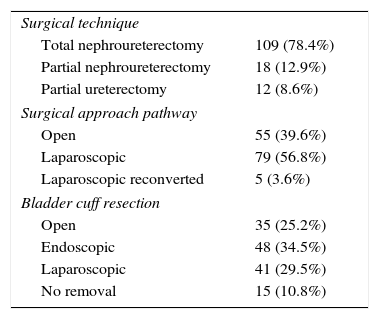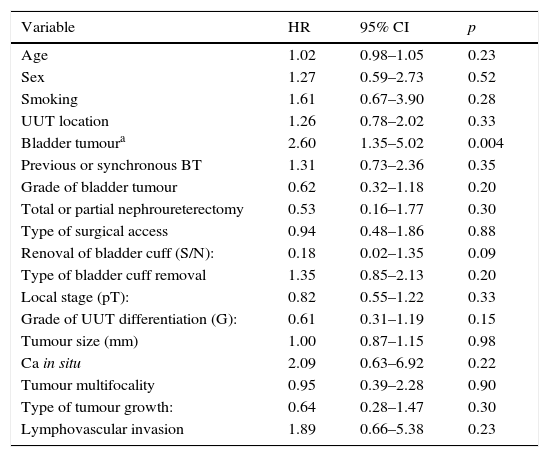To identify the prognostic factors for vesical relapse in patients with tumours of the upper urothelium treated with surgery.
Material and methodsWe conducted a retrospective analysis of patients with tumours of the upper urothelium who underwent surgery between 1999 and 2011 at our centre (139 patients). We collected demographic, clinical, diagnostic and pathological variables, as well as the treatment, complications and progression.
A descriptive analysis was performed using the chi-squared test for categorical variables and the ANOVA test for continuous variables. We also performed a univariate and multivariate analysis using the Cox proportional hazards model. Statistical significance was considered when p<0.05. All calculations were performed with SPSS Statistics version 21.
ResultsDuring the follow-up, 26.6% of the patients (37 cases) showed vesical relapse. Some 19.6% of the patients with no history of bladder tumours showed a bladder tumour relapse compared with 48.6% of the patients with a history of bladder tumours (p<0.001). In the multivariate analysis, only the presence of bladder tumours prior to or concomitant with the upper urinary tract tumour diagnosis was identified as an independent predictor of bladder tumour relapse (p=0.007).
ConclusionIn our series, only the presence of a prior or synchronous bladder tumour behaved as an independent predictor of bladder tumour relapse in patients with tumours of the upper urothelium treated with surgery.
Identificación de factores pronósticos de recidiva vesical en los pacientes con tumor de urotelio superior tratados con cirugía.
Material y métodosAnálisis retrospectivo de pacientes con tumor de urotelio superior operados entre 1999 y 2011 en nuestro centro (139 pacientes). Se recogieron variables demográficas, clínicas, diagnósticas y patológicas, así como el tratamiento realizado, las complicaciones y la evolución. Análisis descriptivo mediante la prueba de la Chi cuadrado para variables categóricas y el test ANOVA para variables continuas.
Análisis univariante y multivariante mediante modelo de riesgos proporcionales de Cox.
La significación estadística se consideró cuando p<0,05. Todos los cálculos fueron realizados con SPSS satistics v-21.
ResultadosDurante el seguimiento el 26,6% de los pacientes (37 casos) presentó recidiva vesical. El 19,6% de los pacientes sin historia de tumor vesical presentó una recidiva en la vejiga, frente al 48,6% de los pacientes con antecedentes de tumor vesical (p<0,001). En el análisis multivariante solo se identificó como factor predictor independiente de recidiva en la vejiga la existencia de tumor vesical previo o concomitante al diagnóstico del TTUS (p=0,007).
ConclusiónEn nuestra serie solamente la presencia de un tumor vesical previo o sincrónico se comportó como factor predictor independiente de recidiva en la vejiga en pacientes con tumor de urotelio superior tratado con cirugía.












